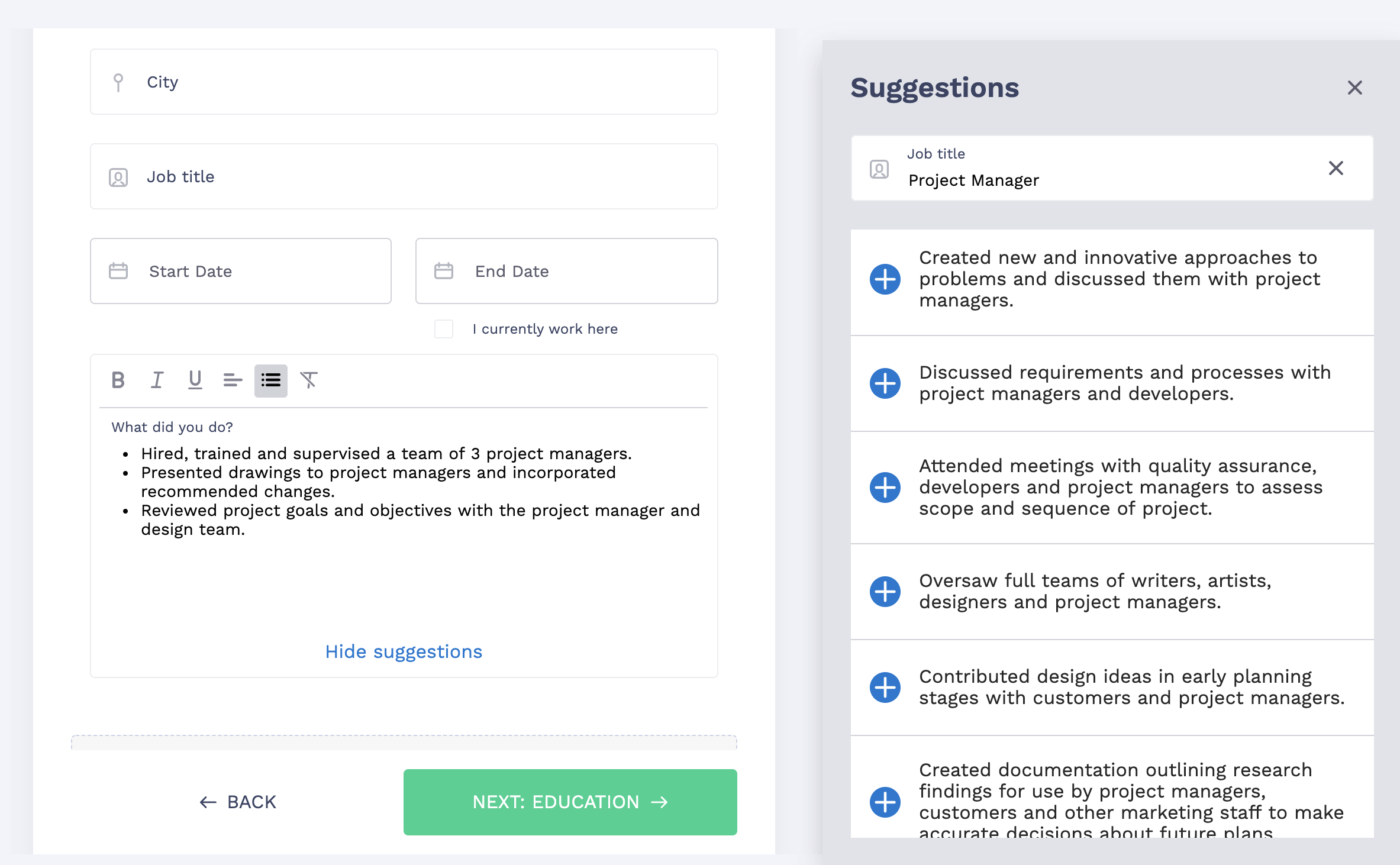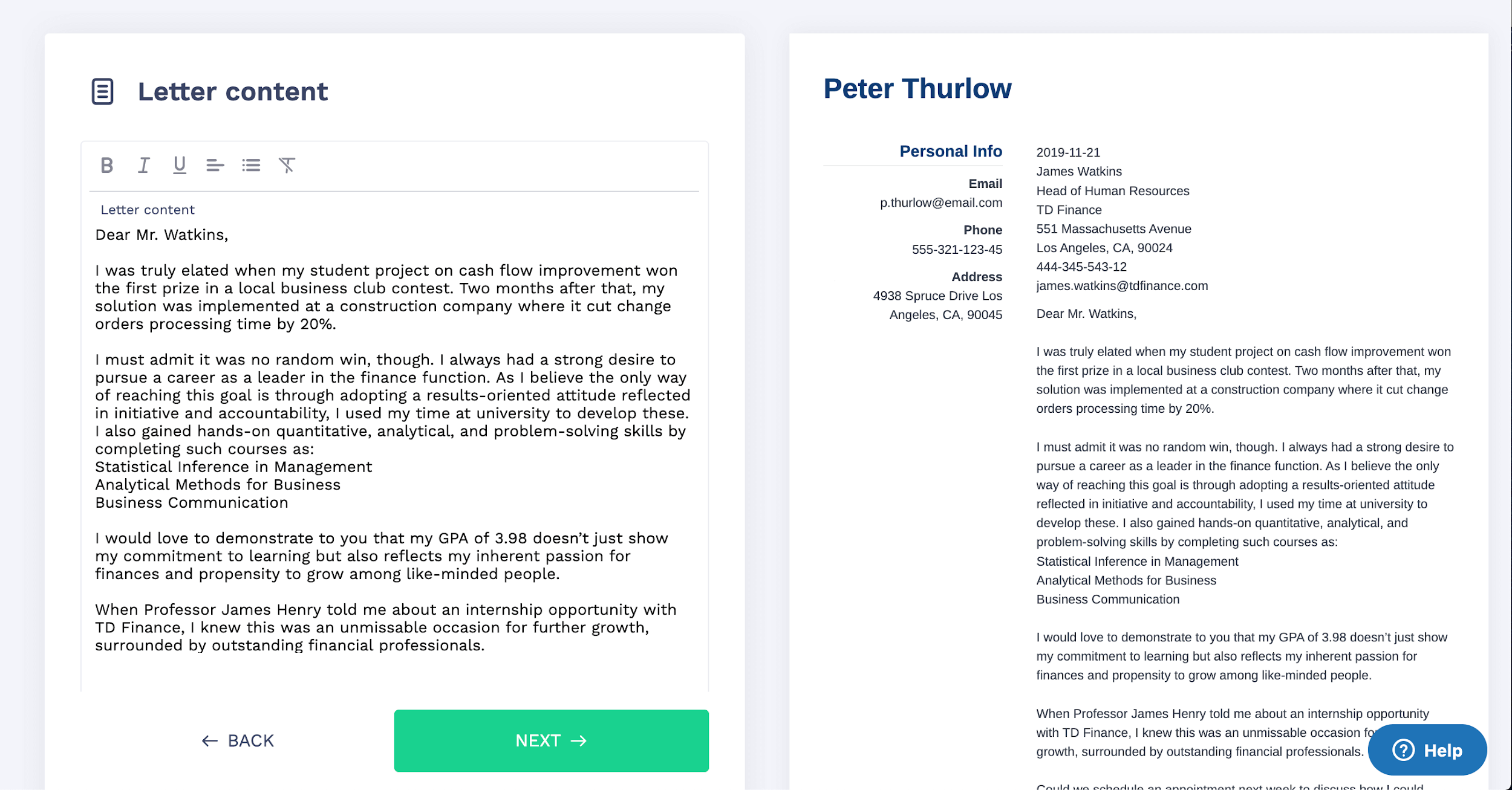
What to Put on a Resume (20+ Best Things to Include)
What to put on a resume? There are 5 must-have sections you need to include in a resume and some extra ones. Read on and learn what should be on your resume.

Christian Eilers
Career Expert

Applying for jobs and not getting much ROI? Boost the present value of your applications and impress recruiters with a Deloitte-ready CPA resume.
The hardest part is behind you. You’ve acquired specialized knowledge, accumulated experience, and secured a pass on your CPA exam. In reconciliation with all that, writing a CPA resume will be quicker and easier than processing weekly payroll.
Here’s how to report on your assets the right way.
In this guide:
Save hours of work and get a job-winning resume like this. Try our resume builder with 20+ resume templates and create your resume now.

What users say about ResumeLab:
I had an interview yesterday and the first thing they said on the phone was: “Wow! I love your resume.”
Patrick
I love the variety of templates. Good job guys, keep up the good work!
Dylan
My previous resume was really weak and I used to spend hours adjusting it in Word. Now, I can introduce any changes within minutes. Absolutely wonderful!
George
Looking for other resume examples and tips for different professions? Consider these related articles:
Sarah Johnson, CPA
Senior Accountant
262-415-9906
sarah.johnson@reslab.com
Linkedin.com/in/6sarah.johnson
Summary
Detail-oriented senior accountant (CPA) with 10+ years of experience and excellent process optimization and leadership skills. Seeking to apply my expertise towards creating and maintaining accurate, predictable, efficient accounting processes for Alt & Co. At Smith & Stone, saved $3k/month in operational costs, produced 50+ financial reports per year, and maintained 98% budgeting accuracy. Saved J&F Solutions 2 man-hours per month by synchronizing pay schedules.
Work Experience
Senior Accountant
Smith & Stone, Cincinnati, OH
October 2018–present
Key achievement:
Accountant
J&F Solutions, Cincinnati, OH
September 2013–October 2018
Education
B.Sc. in Accounting
University of Cincinnati, OH
September 2009–June 2013
Key Skills
Certifications
Memberships
Languages
A CPA (Certified Public Accountant) is an accounting professional who holds a state license enabling them to provide accounting services to the public. A successful CPA resume should highlight the candidate’s relevant experience and skills, as well as showcase their attention to detail.
Here’s how to write a perfectly balanced CPA resume:
Imagine a financial report written in a decorative font, with tiny text and no margins. Or an invoice printed on colored paper and lacking any formatting, so you can’t tell where one section starts and the next begins.
You’d do your best to avoid having to work with a document like that, surely.
Formatting is just as important in resumes as it is in financial statements—you want to make your CPA resume look neat, inviting, and easy to navigate.
Here’s how:
Keep an eye on the length of your resume—in general, the shorter you can make it, the better your chances that it’ll actually be read from beginning to end. If you have fewer than 10 years of experience, one page will be best. For more experienced candidates, a two-page resume should be sufficient.
Expert hint: Not sure where or how to put CPA on resumes? Add your title after your name in the resume header, e.g., John Smith, CPA. Add a separate section on your resume for certifications, too, and list details of your CPA license there. We’ll talk about making additional resume sections in the final chapter of this guide, so stick around for more information!
Your resume profile statement is a short (2–4-sentence) overview of what you can offer the employer. Done right, it will catch the recruiter’s attention and show them straight away that you’re the ideal candidate for the role.
Here’s how to structure yours:
The resulting paragraph is what’s called a resume summary—a type of profile ideal for experienced candidates.
Here’s a CPA resume summary example written according to the above formula:
Detail-oriented senior accountant (CPA) with 10+ years of experience and excellent process optimization and leadership skills. Seeking to apply my expertise towards creating and maintaining accurate, predictable, efficient accounting processes for Alt & Co. At Smith & Stone, saved $3k/month in operational costs, produced 50+ financial reports per year, and maintained 98% budgeting accuracy. Saved J&F Solutions 2 man-hours per month by synchronizing pay schedules.
Short, to the point, and filled with relevant achievements and skills—all while addressing the company (Alt & Co.) directly to show that this summary was tailor-made.
Here’s a not-so-good attempt at a summary, from the same candidate, for comparison:
I’m an experienced CPA used to working in fast-paced environments with challenging projects and tight deadlines. Managed payroll, AR/AP, and financial reporting in the past; authored and implemented several in-house accounting policies. Seeking a stable position with regulated hours and the possibility of career advancement and skill development. Able to provide references from previous employers on request.
This summary is all about the candidate and what they want from the company—which is precisely the wrong thing to focus on. It also lacks concrete information and fails to mention the name of the target employer, making it all too generic and ultimately redundant.
You know what to do if you’re a CPA with a few years of experience. Let’s move on to how to start a resume if you’re not quite so far in your career just yet. If that sounds like you, then you’ll need to write a resume objective instead.
An objective paragraph follows the same basic outline as a summary (above) but focuses on transferable skills and experience, including academic achievements, if professional ones are unavailable. As a CPA you’re likely to have at least a year or two of professional experience, depending on your state, so you can easily rely on things you achieved during this time.
Consider these objective examples:
Driven CPA with 2 years of bookkeeping experience, strong data analysis skills, and a Bachelor’s Degree in Accounting (GPA 3.85). Eager to join Alt & Co. as a junior accountant to handle payroll, AR/AP, ledger reconciliation, and other duties with full accuracy and dedication. As a part-time bookkeeper at Smith & Stone, maintained a 100% error-free track record and digitized 25GB worth of documents within 8 months with no mistakes.
Recent Accounting graduate with a valid CPA license, seeking an in-house accounting position with a reliable company. Characterized by strong attention to detail and determination to put my skills into practice in a full-time accounting role. Have previous experience in bookkeeping.
Just as with the set of summary paragraphs, the correct example is all about what the candidate has to offer to the employer, backed up by concrete facts and numbers. The incorrect example frankly fails to convey any immediately useful information.
If you’re struggling with writing your profile, skip this section for now and return to it once you’re done with the rest of your resume.
No matter your job title or field of expertise, the unfortunate truth is that many of the other applicants will have similar work experience to yours. Specific jobs in accounting, after all, involve near-identical duties.
But there’s good news too: you can stand out by targeting your resume to the job advertisement, and it’s easier than it sounds.
The idea is to tailor your resume work experience section to make it reflect the employer’s requirements. In a way, you’re reconciling your offer with their expectations.
Follow these steps to write a targeted job description:
Senior Accountant
Smith & Stone, Cincinnati, OH
October 2018–present
Key achievement:
That’s how you fill your resume with achievements rather than boring duties! By making this section all about your performance—rather than your responsibilities—you can easily stand out as a high-achiever who takes initiative and owns their actions.
At the same time, you’ll avoid sounding like most other applicants ‘responsible for’ a series of generic tasks:
Senior Accountant
Smith & Stone, Cincinnati, OH
October 2018–present
Note that the candidate’s experience is basically the same across the two examples—it’s all in the way it’s described.
Now, still on the topic of resume keywords—
Make sure to mention a few of them in your resume skills section, too. A reasonably high concentration of relevant vocabulary will make your resume more ATS-friendly:
ATS (Applicant Tracking Systems) software is used by most medium and large companies to sort through incoming applications. Some ATS solutions measure the relevancy of a resume based on cross-checking for keywords—so it’s worth including them in every section.
You should focus on the skills mentioned in the job ad, but in case you’re after a few more, here’s a list of skills to get you started:
As a CPA, you may pursue a range of different career options—make sure that the skill set you include on your resume matches your role as closely as possible. Job-specific skills will be better than a generic list.
The ResumeLab builder is more than looks. Get specific content to boost your chances of getting the job. Add job descriptions, bullet points, and skills. Easy. Improve your resume in our resume builder now.

Nail it all with a splash of color, choose a clean font, and highlight your skills in just a few clicks. You're the perfect candidate, and we'll prove it. Use our resume builder now.
Your experience isn’t the only asset worth declaring. You should also list your education on your resume—and know how to make the most of it if it’s a recent acquisition.
As an experienced CPA, you can stick to the essentials: the name of your highest degree, where you got it, and when. Employers will be much more interested in your work experience than your long-gone school years.
If you’re writing an entry-level resume, though, your education is likely to be your biggest advantage. In this case, expand your education section with additional information that shows your relevant skills, such as your GPA (if it was 3.7 or higher), coursework you excelled at, or extracurricular activities.
Here’s an example:
B.Sc. in Accounting
University of Cincinnati, OH
September 2017–June 2021
Expert hint: Mentioning relevant coursework on your resume is a great way to work a few keywords into your application, especially in the absence of substantial work experience.
Time for a little diversification—
While every valid resume will have work experience and education sections, what follows depends on your individual experience and circumstances. Add a couple of additional sections to your resume, such as:
You can also mention your interests on your resume, but that’s only a good idea if you stick to highly relevant activities. For example, a keen interest in cars will be relevant if you’re applying for an accounting job with a car dealership—but not if you’re going for a tech company.
Here’s an example of a set of additional sections on a CPA resume:
Certifications
Memberships
Languages
Well, it’s safe to forecast success for your CPA resume! Boost its chances by writing an accounting cover letter as well—
Not every employer explicitly asks for one, but most will definitely appreciate it. A cover letter is an opportunity to address the recruiter directly and explain what makes you a safe investment.
Double your impact with a matching resume and cover letter combo. Use our cover letter generator and make your application documents pop out.

Want to try a different look? There's 21 more. A single click will give your document a total makeover. Pick a cover letter template here.
Ready to close the books? Here’s a recap of how to write a successful CPA resume:
Thanks for reading! If you have any questions about writing your CPA resume, start a discussion in the comments section below. We’ll be sure to join in!
At ResumeLab, quality is at the crux of our values, supporting our commitment to delivering top-notch career resources. The editorial team of career experts carefully reviews every article in accordance with editorial guidelines, ensuring the high quality and reliability of our content. We actively conduct original research, shedding light on the job market's intricacies and earning recognition from numerous influential news outlets. Our dedication to delivering expert career advice attracts millions of readers to our blog each year.

What to put on a resume? There are 5 must-have sections you need to include in a resume and some extra ones. Read on and learn what should be on your resume.

Christian Eilers
Career Expert

Money makes the world go round. You’re not planning to let it stop, either. Let’s get you where you wanna be with this finance cover letter.

Dave Rygielski
Career Expert

Build your resume with the same level of diligence you have for financial reports. Learn the good ways of writing a finance resume and which practices you should avoid.

Mariusz Wawrzyniak
Career Expert